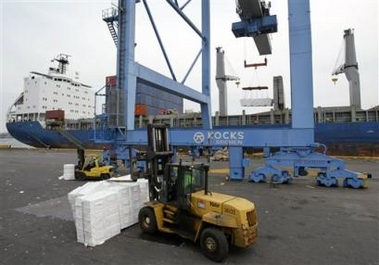|
Dubai firm to give up stake in US ports
(AP)
Updated: 2006-03-10 08:25
Bowing to ferocious opposition in Congress, a Dubai-owned company signaled
surrender Thursday in its quest to take over operations at US ports.
"DP World will transfer fully the US operations ... to a United States
entity," the firm's top executive, H. Edward Bilkey, said in an announcement
that capped weeks of controversy.
|

Longshoremen unload
wood pulp from a cargo ship Thursday, March 9, 2006, at the Tioga Marine
Terminal in Philadelphia. A Dubai-owned company said Thursday that it was
prepared to give up its management stake in some US ports, a move made as
congressional leaders warned President Bush that both the House and Senate
appeared ready to block the contoversial takeover.
[AP]
|
Relieved Republicans in Congress said the firm had pledged full divestiture,
a decision that one senator said had been approved personally by the prime
minister of the United Arab Emirates.
"The devil is in the details," said Senate Democratic Leader Harry Reid of
Nevada, reflecting a sentiment expressed by numerous critics of the deal.
The announcement appeared to indicate an end to a politically tinged
controversy that brought President Bush and Republicans in Congress to the brink
of an election-year veto battle on a terrorism-related issue. The White House
expressed satisfaction with the outcome.
"It does provide a way forward and resolve the matter," presidential
spokesman Scott McClellan said.
"We have a strong relationship with the UAE and a good partnership in the
global war on terrorism and I think their decision reflects the importance of
our broader relationship," he said.
A leading congressional critic of the ports deal, Rep. Peter King (news, bio,
voting record), applauded the decision but said he and others would wait to see
the details. "It would have to be an American company with no links to DP World,
and that would be a tremendous victory and very gratifying," said the New York
Republican, chairman of the House Homeland Security Committee.
"This should make the issue go away," said Senate Majority Leader Bill Frist.
The Tennessee Republican was one of several GOP leaders to tell President Bush
earlier in the day that Congress was ready to ignore his veto threat and scuttle
the deal.
Several Republican officials, speaking on condition of anonymity, said Frist
and Sen. John Warner (news, bio, voting record), R-Va., chairman of the Armed
Services Committee, had been privately urging the firm to give up its plans.
After weeks of controversy 锟斤拷 and White House veto threats that spokesman
Scott McClellan renewed at midmorning Thursday 锟斤拷 the end came unexpectedly.
The House Appropriations Committee voted 62-2 on Wednesday to block the deal,
and GOP congressional leaders privately informed the president Thursday morning
that the Senate would inevitably follow suit. Senate Democrats clamored for a
vote, increasing pressure on Senate Republicans to abandon the president.
It was unclear how DP would manage the planned divestiture, and Bilkey's
statement said its announcement was "based on an understanding that DP World
will not suffer economic loss."
The firm finalized its $6.8 billion purchase Thursday of Peninsular &
Oriental Steam Navigation Co., the British firm that through a U.S. subsidiary
runs important port operations in New York, New Jersey, Baltimore, New Orleans,
Miami and Philadelphia. It also plays a lesser role in dockside activities at 16
other American ports.
Despite the furor, the company's U.S. operations were never the most prized
part of the global transaction. DP World valued its rival's American operations
at less than 10 percent of the nearly $7 billion total purchase.
But that portion of the deal set off a political chain of events unlike any
other in Bush's five years in office. Republicans denounced the deal, saying
they were worried about the effects it would have on efforts to make ports safer
from terrorist threats. Democrats did likewise, and capitalized on the issue as
well as a way to narrow the polling gap with the GOP on issues of national
security.
Bush defended the deal, calling the United Arab Emirates a strong ally in the
war on terror and pledging to cast a veto if Congress voted to interfere.
Senate Republicans initially sought to fend off a vote to block the deal, and
the administration agreed to a 45-day review of the transaction. That strategy
collapsed on Wednesday with the vote in the House Appropriations Committee.
Warner, R-Va., provided the first public word of the firm's switch, when he
went to the Senate floor and read aloud from its statement.
Warner said that Sheikh Mohammed Al Maktoum, prime minister of the United
Arab Emirates, "advised the company ... that this action is the appropriate
course to take."
|